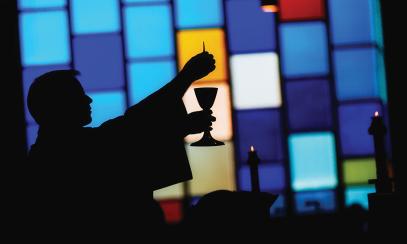
The Power of Contemplative Prayer
“Thus, the life of prayer is the habit of being in the presence of the thrice-holy God and in communion with Him” (Catechism of the Catholic Church, #2565).
As children of the living God, we have an inherent connection with our Father, which allows us to experience His presence and His infinite love for us. However, we know He is Almighty to us sinners, and, just like Moses on the mountain, we cannot face Him.
Perhaps this inner conflict holds us back from fully immersing ourselves in the Truth. Every time that thought crosses our minds, we should remind ourselves that our heavenly Father, in His immense love for us, gave His only Son, so we can face Him on the cross; moreover, we can eat His holy Body and drink His precious Blood.
Through His agony and sacrificial death on the cross, Jesus became a gateway to our heavenly Father. This openness of God through the Holy Spirit, our Paraclete, comes at a great cost, yet it is free to all who want to receive it. Prayer is not some difficult-to-obtain way to meet with a distant God but rather an actual event of meeting with Our Father, here and now, in contemplation of His love.
Our Mother Church, in her rich tradition, offers many forms of contemplative prayer. I would like to mention two well-established schools of prayer known as Lectio Divina and St. Ignatius of Loyola’s contemplation.
As Hans Urs von Balthasar often said, prayer is a meeting with the Word that became Flesh. In Lectio Divina, we meet with the living Word through careful reading of the holy Scripture. Traditionally, it has four parts: Lectio (read); meditatio (meditate); oratio (pray); and contemplatio (contemplate).
During the prayer, the same passage is read several times, and the Holy Spirit allows us to get a deeper understanding of one specific word, phrase or sentence. The Word will speak to the contemplative in a new way that is true and valid here and now.
In the St. Ignatius of Loyola school of prayer, we read a specific passage or a full chapter from the Bible and try to place ourselves in the scene described in the Scripture. We apply all our senses to meet Jesus Christ in the specific moment or event. St. Ignatius, in writing his “Spiritual Exercises,” encourages us to give up on our selfish attachments so we can become free to discern God’s Will for us.
In prayer, our minds, hearts and souls unite with the Holy Trinity. Each faculty, whether it is our minds, hearts or souls, becomes one, just like the Father, the Son, and the Holy Spirit are One. We might direct our prayer “just” to the Father, or to the Son, or to the Holy Spirit, but, ultimately, we unite with the whole Trinity.
In Lectio Divina, we begin the prayer by using our mind to ultimately immerse all three faculties: the mind, the heart and the soul. In Ignatian spirituality, we start from the heart. Here, we “use” our emotions and feelings first when reading a chosen passage and then our whole being becomes one with the Lord.
Prayer is deeply personal, yet it can take place in total solitude, as well as in the multitude of many. Jesus Christ, at times, prayed in the desert alone but also, at other times, with crowds gathered around Him. When we pray together, we pray for each other just like all the angels, saints and heavenly dominions do in heaven, and, when we pray alone, we are strengthened by the communion of all gathered in Christ.
This special communion with our brothers and sisters and all saints of the heavenly kingdom is most present in each Mass. During liturgy, we praise and adore our Savior. As we first listen to the Word, here and now, it becomes the human Flesh and Blood. We are all one with Him, in Him and through Him.
We often equate contemplative prayer with some advanced approach too hard for everyday living. Prayer, as a grace given to us, whether it is a 30-day retreat or just a sigh of help to our Lord, is contemplative in its nature, as long as we are giving ourselves completely to the true Love of God.
Jesus’s prayer to our Father is simple, yet it opens an everlasting well of revelation to us. The great paradox of prayer, just like in our faith, is the small, simple and weak aspects in us that we freely offer to God so that He can make us His, resurrected and transformed into the fullness of the Truth.



